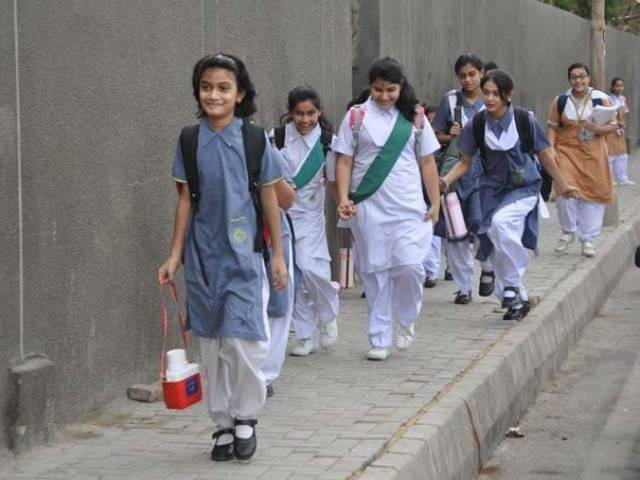
This was revealed in the latest annual Global Education Monitoring Report by United Nations Educational, Scientific and Cultural Organization (UNESCO), which highlighted that there were as many as 80 students per teacher in private schools.
The report showed that while there are regulations governing the number of students per teacher in public schools, there are no such requirements for private schools where an estimated 30 per cent of students study.
Hence, there were 37 pupils for each teacher in public schools, but around 80 pupils per teacher in private schools, the report said.
The report, ‘Accountability in education: Meeting our commitments’, which was launched globally recently, said that there are still major challenges which Pakistan needs to overcome before it can achieve its global education goal, Sustainable Development Goal 4.
Moreover, the report noted that salaries of teachers were one of the major problems afflicting education in the country, with Pakistan having has some of the world’s highest levels of inequality and lowest levels of education spending.
Moreover, the report noted that the country uses test scores as part of teacher evaluations. It warned that this method should not be used disproportionately since it breeds a culture of teacher-blaming for learning failures which can be influenced by many factors outside of teacher’s control. These include student skills, behaviour, parental background and support, school resources, culture, and curriculum design.
The report emphasises that accountability starts with the governments which should develop credible and efficient regulation, monitoring mechanisms while adhering to follow-up sanctions when standards are not met.
Despite that, it noted that in Pakistan there were virtually no regulations for public or private schools on health and safety or none that can be easily found, and therefore used.
A third of the schools in the country, it said lacked water or basic sanitation facilities while only half of all government schools have usable toilets.
It further highlights the need for Pakistan to focus on equipping teachers with the skills needed to fulfil their responsibilities. It also highlights a lack of accountability in Pakistan’s teacher recruitment, citing political interference, nepotism, ghost teachers and non-transparent practices.
Despite SDG 4 calling for 12 years free quality education for all, there were over 5.5 million children out of school, 60 per cent of whom are girls, the report says.
Furthermore, there were almost 5.5 million out-of-school adolescents, of which around 61 per cent complete primary education, but less than half (46 per cent) of students complete lower secondary education.
The report also highlights issues relating to the poor quality of education since there are 56 pupils for every trained teacher in primary education.
The youth literacy rate stands at 73 per cent, it states, meaning that at least one in every four youngsters cannot read. This adds to the 51.5 million adults who are unable to read a simple sentence — 63 per cent of which are women.
Despite these significant deficiencies, the report said that Pakistan only spends around 2.65 per cent of GDP on education, below the global benchmark of four per cent benchmark.
A UNESCO situation analysis estimated that reaching the primary enrolment rate of 100 per cent by 2015-16 would have required, “besides massive improvements in governance and implementation, a fund of PKR 1.300 trillion.”
In the context of literacy, the report said the cost of teaching 36 million people literate to read in the next five years would require PKR 1.79 trillion.
The report, though, also commended some of the initiatives taken by federal and provincial governments such as producing a national education monitoring reports, making the right to education justiciable in national law — a move opted for by only 45 per cent of countries worldwide, introduction of biometric attendance systems in schools, school report cards, and provision of vouchers to schools in Sindh.
Published in The Express Tribune, October 30th, 2017.

1732530816-0/BeFunky-collage-(88)1732530816-0-165x106.webp)
1720848500-0/Eminem-and-his-daugher-Hallie-(1)1720848500-0-165x106.webp)




1732529980-0/Copy-of-Untitled-(84)1732529980-0-270x192.webp)

1732530440-5/Copy-of-Untitled-(85)1732530440-5-270x192.webp)







COMMENTS
Comments are moderated and generally will be posted if they are on-topic and not abusive.
For more information, please see our Comments FAQ